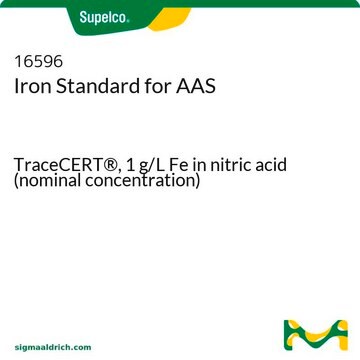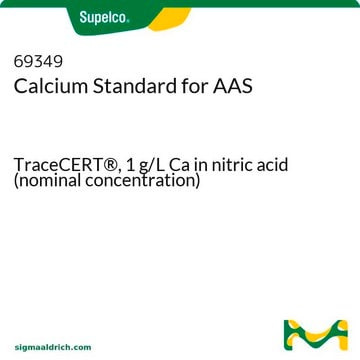All Photos(1)
About This Item
Empirical Formula (Hill Notation):
C6H12O6
CAS Number:
Molecular Weight:
180.16
EC Number:
MDL number:
UNSPSC Code:
12352201
PubChem Substance ID:
Recommended Products
Assay
≥97.0% (HPLC)
optical activity
[α]/D -13.0±1.0°, c = 1 in H2O
storage temp.
−20°C
SMILES string
OC[C@@H]1OC(O)[C@@H](O)[C@@H](O)[C@H]1O
InChI
1S/C6H12O6/c7-1-2-3(8)4(9)5(10)6(11)12-2/h2-11H,1H2/t2-,3-,4-,5-,6?/m0/s1
InChI key
WQZGKKKJIJFFOK-HOWGCPQDSA-N
Application
L-Allose is a pure enantiomer that may be used with other aldose substrates such as D-lyxose, D-mannose, L-ribose, and D-talose to identify, differentiate and characterize aldose isomerase(s) and epimerase(s).
Packaging
Bottomless glass bottle. Contents are inside inserted fused cone.
Other Notes
To gain a comprehensive understanding of our extensive range of Monosaccharides for your research, we encourage you to visit our Carbohydrates Category page.
Storage Class Code
13 - Non Combustible Solids
WGK
WGK 3
Flash Point(F)
Not applicable
Flash Point(C)
Not applicable
Personal Protective Equipment
dust mask type N95 (US), Eyeshields, Gloves
Certificates of Analysis (COA)
Search for Certificates of Analysis (COA) by entering the products Lot/Batch Number. Lot and Batch Numbers can be found on a product’s label following the words ‘Lot’ or ‘Batch’.
Already Own This Product?
Find documentation for the products that you have recently purchased in the Document Library.
Eun-Ah Cho et al.
Journal of bacteriology, 189(5), 1655-1663 (2006-12-26)
A newly isolated bacterium, Cohnella laevoribosii RI-39, could grow in a defined medium with L-ribose as the sole carbon source. A 21-kDa protein isomerizing L-ribose to L-ribulose, as well as D-lyxose to D-xylulose, was purified to homogeneity from this bacterium.
Tian Tian et al.
Journal of agricultural and food chemistry, 66(38), 10067-10076 (2018-09-04)
Emerging research into the bioactivities of indigestible carbohydrates is illuminating the potential of various foods and food streams to serve as novel sources of health-promoting compounds. Oligosaccharides (OS) are widely present in milks and some plants. Our previous research demonstrated
Daniele D'Alonzo et al.
The Journal of organic chemistry, 73(14), 5636-5639 (2008-06-24)
An expeditious and efficient synthesis of 1,6-anhydro-beta-L-hexopyranosyl derivatives 3 as valuable building blocks for the preparation of L-sugars is herein reported. This route relies upon the use of a domino reaction involving five synthetic steps from the 5,6-dihydro-1,4-dithiin 4. As
Dhananjoy Mondal et al.
Carbohydrate research, 345(11), 1533-1540 (2010-05-19)
Conformationally constrained amino acid analogs are widely used to probe the bioactive conformation of peptides. In this paper we report on the synthesis of hexafunctional allose-templated L- and D-hydroxyornithine and L- and D-hydroxyarginine analogs in which the allose-based polyol scaffold
Nobumitsu Miyanishi et al.
Biosensors & bioelectronics, 26(1), 126-130 (2010-06-15)
Rare sugars are defined as monosaccharides and their derivatives that rarely exist in nature, according to the International Society of Rare Sugars. D-Allose (3-epi d-glucose) is one of the rare sugars, for which various physiological activities have recently been found
Our team of scientists has experience in all areas of research including Life Science, Material Science, Chemical Synthesis, Chromatography, Analytical and many others.
Contact Technical Service







